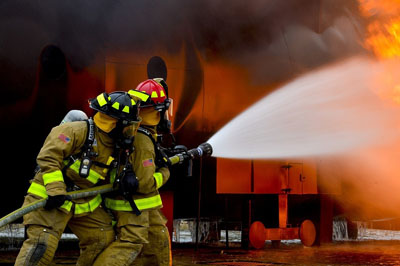Keeping Firefighters Healthy

Firefighters push their bodies to the maximum on an almost daily basis. While the equipment they wear provides protection from fire and smoke, these men and women are not always prepared to address, treat, or prevent potential musculoskeletal injuries suffered on the job.
That’s where the new Neuromechanics, Interventions, and Continuing Education Research Laboratory (NICER) from Indiana State University’s College of Health and Human Services and Department of Applied Medicine and Rehabilitation comes in. Opened on September 11, the lab provides training and evidence-based programs to keep these injuries from sidelining firefighters.
According to an article from The Tribune-Star (Terre Haute, Ind.), NICER operates as a free clinic for Terre Haute Fire Department firefighters for four hours each day. Instead of concentrating on weight training and endurance, the tactical athlete approach at NICER engages firefighters in flexibility work, as well as other functional movements of their occupation. The clinic also serves as a classroom for the athletic training program at Indiana State.
“There is tremendous physical and mental toll taken on public servants, but they often don’t take the time to stay fit,” said Kenneth Games, PhD, LAT, ATC, Indiana State Associate Professor and Director of Clinical Education for the Doctor of Athletic Training Program within the Department of Applied Medicine and Rehabilitation.
Fueling the initiative is research into the benefits of tactical athlete health and safety on the overall physical health of those in public service occupations. Dr. Games, who also directs the Tactical Athlete Research and Education Center at Indiana State, explains that research from the NICER lab has found the protective equipment that firefighters wear has some potential negative effects on the body. Although it keeps them safe from occupational hazards, the equipment adds more weight for the firefighters to carry, increasing their chances of musculoskeletal injury.
“It’s about the overall health and well-being of the person, not just the job they do.”
Dr. Games
The care provided by NICER might be common for larger fire departments that can afford to hire athletic training professionals to work with their firefighters. But for smaller departments, like the one in Terre Haute, the options are generally limited, giving firefighters nowhere to turn to learn best practices of caring for their bodies.
To help with funding for the clinic, Indiana State’s Center for Community Engagement provided a grant. And Dr. Games is hoping to apply for federal funds in order to help other public servant groups reap the benefits of programs like NICER in the future.
“Our long-term vision is to make Indiana State and the city a national model for this type of program.”
Dr Games



